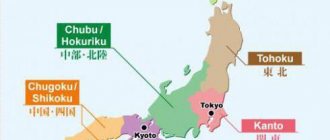Working in Japan is a great way to settle in one of the most technologically advanced and progressive countries in the world, which at the same time sacredly respects traditions and foundations. But when planning to emigrate on the basis of employment, you should remember that the migration policy in this island state is among the most strict and closed in the world. Those whose profession is in demand on the local labor market have the best chances.
Independent job search
To get a job you need to find an employer. If you don't know where to start, check out the HelloWork employment service website. It is located at https://www.hellowork.go.jp/. Here you can find out about vacancies throughout the country and get advice on employment in English.
If you are fluent in Japanese, look for advertisements in the media. Japanese newspaper websites:
- https://www.japantimes.co.jp/ – a news resource covering life in Japan in English and Japanese;
- https://the-japan-news.com/ is a popular publication where you can read news and view employer advertisements.
Write letters directly to large corporations - qualified foreign employees are required at Mizuho Financial, Toyota Motor, Mitsubishi.
You can take part in special government programs aimed at employing qualified, talented foreigners. One of them is called the Japan Exchange and Teaching Program (JET) and helps athletes, teachers, and creative individuals find jobs.
Working relationships in general
In Japan, it is very difficult to fire someone. But you can push a person to leave in every possible way. Here are some ways you can lose your job:
- They are putting pressure on you, forcing you to leave. Management constantly puts you under stress. If this happens to you, just leave. You will find a job quickly.
- Restructuring. If the company is downsizing, you may be laid off too. This is not very common in the tech industry, and in this situation you will be paid severance.
- Assigning you meaningless tasks. I haven’t seen this in IT, but it happens in other industries. That is, you will simply be so bored that you will leave on your own.
- Refusal to renew contract. It all depends on the circumstances and the contract itself.
Bad bosses, harassment
There are many ways in which some people can humiliate others, and the Japanese government takes this issue very seriously. If you complain about some form of harassment and the company doesn't properly investigate it, it could be in serious trouble.
If your boss does something that humiliates you, such as:
- talks to you differently than to your colleagues (i.e., worse),
- gives you unrealistic tasks or puts a lot of pressure on you (more than others),
- sets special rules for you,
- allows some kind of physical contact that you find unacceptable,
- humiliates you in front of your colleagues,
- does not invite you to social events,
– in all these cases, you can contact the CEO or HR, and they will sort out the situation.
From my own experience (male and non-Japanese) I can judge that harassment is a rare phenomenon here and is dealt with quickly.
Relationships with colleagues
Periodically going out with colleagues to eat and drink is a common practice. If you don't want to drink, they won't force you. I was invited to walks in the park and rock climbing.
I have never been expelled from a team because I am not Japanese. And they were never invited anywhere as a “talking foreigner.” If they are doing this to you, it is a bad environment, change it.
My colleagues were very enthusiastic about practicing their English. I must say that if you are fluent in English, you will have a huge advantage in our field of work. You will be able to read the English version of Stack Overflow and understand error messages better. I'm not kidding: Japanese Stack Overflow is a garbage dump. If you can find information in English and then convey it in Japanese, that's just your superpower.
Job sites
The labor market in Japan can be studied on special websites. For example, there is a center operating with the support of the Ministry of Social Security and Health of Japan - it helps students and foreigners legally residing in this country find work. His address is tokyo-foreigner.jsite.mhlw.go.jp/english/spec_1/about/info_1.html.
There are also resources for finding job openings in different industries. The rating of job search sites for CIS residents is topped by https://japan.hh.ru/. Here you can study offers in Russian, post your resume and read information useful for employment.
More information and opportunities are available on English-language resources. They make it easy to find a vacancy remotely, contact the employer and clarify all the details. Here is a list of sites providing employment services:
- GaijinPot; – offers a variety of full-time and part-time positions;
- https://www.daijob.com/en/ – gives everyone the opportunity to find a job in Japan;
- https://getstudents.net/ – provides a large selection of jobs for English and Russian language teachers;
- https://www.jobsinjapan.com/ – posts advertisements from employers from all over Japan;
- https://www.tokyonoticeboard.co.jp/ – publishes various information once a week, including job advertisements.
If you have any difficulties finding the right vacancy, you should turn to intermediaries for help. They have thoroughly studied the labor market and know where to look for suitable work. Once you decide to turn to professionals, choose proven paid sites to eliminate cases of fraud. Well proven:
- https://nextinjapan.com/ - created specifically for foreigners and helps to find work in any major city in Japan;
- https://staff.hiwork.jp/ – has an extensive database of vacancies, which is updated daily.
Consultants help you format your resume correctly and write a letter to the employer highlighting the best aspects of the candidate.
Choosing a city
When moving, it is also necessary to take into account the peculiarities of employment in different parts of the country. This factor affects not only the level of income and the ability to find a job in general, but also the cost of living.
So, where is the best place to go to work in Japan:
- Sapporo - This city is one of the most important industrial, economic and educational centers on the island of Hokkaido. The fifth largest populated area in the country. It is considered one of the safest Japanese cities.
- Osaka is the third most populous city in Japan and has a bustling nightlife. The main direction is tourism. About 3 million tourists come here every year. In various ratings, the city is included in the top 100 best places on the planet in terms of quality of life.
- Tokyo is the focal point of the country's financial, industrial, business and cultural life. Work in Tokyo is possible for highly qualified specialists, businessmen, and creative individuals. But do not forget that prices for current expenses in the capital are high.
- Yokohama is a city located 30 km from the capital. Major seaport and commercial center of Japan. Biotechnology and shipbuilding are also developed here.
- Fukuoka is a large port city, the center of the industrial region of Northern Kyushu.
You can also look for work in other major cities of Japan: Nagano, Akita, Wakayama, Nagasaki, Matsuyama.
Finding jobs through agencies
Agencies provide the same services as other paid Internet resources. Their cost is negotiated individually. Rates typically start at $500. For this money you can:
- get the desired vacancy;
- legally enter Japan with a work visa issued by agency employees;
- safely reach the place of work along the route developed by specialists.
To use the services of an agency, you should send your resume there, pay for the work of its employees and wait until they find a vacancy for you.
Overview of employment agencies
Experienced people advise contacting Japanese recruitment agencies - thanks to them, you will quickly achieve success and get a job. Among these resources are:
- https://www.a-10.com/ is a diversified job search company that focuses on the quality of its work. During the employment process, employees provide professional advice to clients;
- https://www.aecjpn.com/ – the agency works with leading companies in Japan and is engaged in the employment of highly qualified specialists;
- https://www.brookeconsulting.com/ is a well-known Japanese recruiting company that has helped many people find employment.
From agencies in the CIS you can o. It is located at https://tourpartner.com.ua/ru/work/rabota-v-japan-JP.html. Over 8 years of intensive work, the company has proven itself well. To contact its employees, you can leave a request or call the phone number listed on the website.
Stages of employment
After finding a vacancy, you need to convince the employer that he needs you. To do this, present yourself in the best possible light.
At the same time, do not forget to indicate not only professional skills in your resume - describe your personal qualities, convince the employer that you are a workaholic and dedicated to your work. The Japanese value such people and give them preference. Be sure to indicate that you speak Japanese (preferably) or English, otherwise the chances of you getting a job are minimal.
An employment contract in Japan requires the employer to inform the employee in writing about the terms of employment, describe the workplace and responsibilities, and clarify the hours of work, breaks and vacations. The boss must also indicate the amount of the salary, the timing of its payment and set out the grounds for dismissing the employee.
After the agreement is concluded, the employer becomes your guarantor and sends you a job offer. This is an important document, without which you will not be able to obtain a work visa and go to work.
Do you need to know Japanese?
Those who plan to work in a foreign country should remember once and for all: without knowledge of the local language, the chances of successful employment are minimal. This fully applies to the Land of the Rising Sun: how well you speak Japanese directly determines what position you can apply for.
If you have insufficient knowledge of the Japanese language, you cannot count on work that involves direct communication with clients. There is also no chance of getting a job in an international corporation or a large Japanese company. Possible employment options include working with compatriots and low-skilled labor in small local firms.
Video: what a foreigner needs to get a job in Japan
How to apply for a work visa
To enter the country, you need a positive decision from the Department of Consular and Immigration Affairs of the Ministry of Foreign Affairs of Japan. He is responsible for issuing visas for short- and long-term stays in the country with the possibility of working.
There are two types of work visa to Japan:
- the first with “Residence Status” is tied to a specific profession and prohibits engaging in other types of activities;
- the second type of work is not specifically indicated, but it is more difficult to obtain.
Qualified specialists can apply for a visa for a period of 1-3 years with subsequent extension up to 5 years. They are allowed to bring family members with them. The mother and father are issued a visa for a year with the possibility of extension; children and spouse can stay in the country from 1 to 5 years.
Before submitting your documents, do not forget to pay money for the visa. How much a work visa to Japan costs depends on how long it is issued for. The cost of a short-term visa is 3,000 yen - about 27 US dollars. A long-stay visa costs twice as much. The cost of an entry permit to Japan also depends on the purpose of the visit and on the country in which the documents are issued.
Rules for obtaining a work visa
Obtaining a visa depends on many factors. First of all, the person submitting the documents must comply with the requirements of Japanese law and not fall under the provisions of Article 5, Paragraph 1 of the Immigration Control Law.
To obtain permission to enter Japan, an immigrant must present:
- a valid passport of the country from which he is traveling for work;
- international passport;
- correctly completed visa documents.
The above documents should be submitted to the Consular Section of the Japanese Embassy and await a decision. This takes about 5 days.
List of documents for visa application
To obtain a work visa, you need to collect a large package of documents. It includes:
- original and copy of passport;
- copy of internal passport;
- 2 color photos 4.5x4.5 cm;
- 2 visa forms, correctly filled out;
- signed employment contract;
- documents provided by the employer (registration certificate, tax payment receipt, certificate of registration of the legal entity hiring the employee);
- a letter from the employer explaining why he invited a foreigner to the country;
- documents confirming the employee’s qualifications.
To obtain a work visa you also need a Certificate of Eligibility. It determines the applicant's status and indicates that the person can engage in professional activities in Japan. This document is prepared by the employer.
Sometimes the consulate individually requests other documents. It depends on what vacancy and from what country the foreigner is coming. Do not forget that submitted documents, except for your passport, will not be returned, so if necessary, make copies in advance.
Not everyone can cross the border into Japan. Certain categories of citizens are prohibited from entering:
- formerly convicted for more than 1 year;
- citizens held accountable for distribution and possession of narcotic substances;
- foreigners who were deported from the country less than 1 year ago.
- citizens involved in illegal business related to prostitution.
In other cases, there should be no obstacles to entering Japan.
How to extend a visa
If you intend to continue working in the country and your visa expires, it can be extended. To do this, you should contact the immigration service in advance. After submitting the application, the visa is extended within 2 months. For a positive decision, you need to submit documents confirming that you really work and pay the visa fee.
Usually there are no problems with visa extension. Having received it, you can go home and return to Japan without applying for an entry permit if your absence from the country lasted less than a year.
Teacher vacancies: requirements for applicants
Anyone who plans to engage in teaching must have a state diploma and license. A future teacher of, for example, English should analyze the list of educational institutions where he can work. In Japan, there are well-known prestigious schools with a large branch network throughout the country and many small schools. You should study the working conditions in advance, compose and send your resume. If the application is accepted and the interview is completed, the candidate is entered into an employment contract for at least 1 year. It is better to search for the right job while already in the country, since very few Japanese educational institutions provide information about vacancies on international websites. The salary, depending on the prestige of the school and its location, averages 500,000 yen.
average salary
At the initial stage, your salary will be less than that of natives. Once you get a job, you can count on 160,000-200,000 yen per month. This is about 1400-1800 dollars.
A qualified worker has more income. The average salary in the country reaches 350,000 yen ($2,650). The minimum wage is $7 per hour. It is received by unskilled workers.
Employers pay bonuses several times a year. Their payment depends on the company's profit. Some companies pay foreign specialists for housing and transportation costs.
The law requires deduction of taxes to the pension fund and payment of insurance premiums - this takes 10% of wages.
Japanese work mentality
Many people have long known that the Japanese are hardworking people. Very often, legends and anecdotes are told about the hard work of the Japanese.
However, the management system is probably the main criterion for such a stable economy in Japan. Japanese management is generally based on collectivism.
Every Japanese has personal qualities that a European will have to cultivate within himself for a very long time. Hard work, honesty, full dedication, responsibility, the desire to achieve something more - all these qualities are present in almost every Japanese from birth. Arriving in the Middle Kingdom, it will be important for employers to know whether you can work like a cog in a large and well-coordinated mechanism.
Many Japanese do not understand why European people change jobs so often, even once a year is a lot. The Japanese are very loyal people, they work in the same establishment for decades, there are even cases when the company hired an employee for life.
Work for residents of the CIS
Before planning a trip to earn money, you need to find out where foreigners work in Japan. The country's labor market requires professionals who are ready for a busy schedule and overtime. The economy is built on advanced technologies, so it is not difficult for an experienced programmer, engineer or IT specialist to find a job. Such vacancies imply a decent salary, which varies between 400,000-750,000 yen or $3,150-5,900.
Japan's labor shortage is acute in the medical field. Highly qualified pharmacists and scientists are also required. They are offered from 500,000 to 950,000 yen ($3,900-$7,000).
The main industries in which CIS citizens can also find work:
- mechanical engineering;
- food industry;
- electronics;
- banking system;
- information Technology.
Girls with a bright appearance often find work as dancers or models.
Work for Belarusians
Work in Japan for Belarusians is the same as for other foreigners. In any industry, experts in their field and people who are fluent in Japanese are valued.
A large selection of vacancies in trade - you can get a job as a middle manager, a store administrator, or a sales specialist. To do this, it is important to know the local market well and be sociable. The salary for sales workers is 350,000 yen ($2,500).
Work for Uzbeks
The government of Uzbekistan is cooperating with Japanese companies to attract its citizens to work in Japan. It is ready to provide the Land of the Rising Sun with the necessary specialists in various fields of activity.
In particular, work in Japan for Uzbek citizens is possible in the medical sector. During 2021, it was planned to employ about 1,000 mid-level medical workers there. To be included in their number, it was necessary to meet certain requirements: have a diploma in medical education and know the Japanese language at level 4, that is, speak it fluently.
For Uzbeks who go to Japan to earn money, there are also quite a lot of chances to find work as a driver, taxi driver, or machinist.
Work for Kazakhstanis
In Japan, IT specialists and English language teachers are valued, so professionals can safely count on a stable income and career growth.
Work in Japan is available for Kazakhstanis in various fields. For example, fashion designers and architects are now in demand. Foreigners are valued for their unconventional approach to work and creative proposals.
Many people find jobs in factories and factories. If there is no qualification, then this is usually hard physical work assembling household appliances.
Work for Ukrainians
Japan offers many vacancies for Ukrainians, but knowledge of Japanese and English is required everywhere. In particular, you can get a job:
- in the tourism sector;
- sports instructor;
- manager;
- translator;
- pharmacist.
Girls with an attractive appearance have a greater chance of finding a job. The Japanese are captivated by Slavic beauty, so Ukrainian women can easily get positions as salespeople, models, or singers.
For men without higher education, there are vacancies for construction workers and factory workers. To weigh all the risks, before planning a trip, it is worth finding out what kind of work is currently available for Ukrainians in Japan.
Work for all residents of the CIS
When choosing a place to go to work, it is worth considering that Japan is a conservative country. Even though its population is rapidly aging, the government is reluctant to open its doors to immigrants. Therefore, without qualifications and specialized education, finding a job is almost impossible. If circumstances are favorable, you can get a job:
- waiter;
- as a laborer in a factory;
- maid;
- cleaner
The salary of such people is minimal, and it is not enough to live in Japan.
In-demand specialties in 2021
Vacancies for Russians in Japan are presented quite widely. The main thing here is not citizenship, but the legal legal status of staying in the country and the presence of the necessary professional qualifications. What kind of work can you do in Japan? If we are talking about the stronger half of humanity, then work in Japan for men is represented by a wide range of working specialties: construction workers, sailors on fishing vessels, workers at a car dismantling station, etc.
Having in-demand qualifications and extensive work experience in the specialty automatically increases the employee’s value in the eyes of the employer. A Russian can easily get a job as a programmer, translator of Russian or English, or teacher of language courses. In-demand professions for women are presented mainly in the service and entertainment sector - hostess in a restaurant or model in a nightclub.
For girls
Despite the fact that Japan is considered the safest country in terms of street crime and the overall number of violent crimes, work for girls has its own specifics. If a job as a model or dancer in a nightclub is offered through social networks, then it is imperative to find out what kind of establishment and city we are talking about. You should also ask in advance to send a copy of the employment contract in English. The text of the contract must indicate details. It is desirable that the employer is a legal entity. The contract must clearly list the girl's responsibilities, her working hours, the amount of weekly pay and other conditions.
If we are talking about modeling agencies, it is recommended to find out the history of this company in advance or ask other girls who have worked there before. This can be done through social networks. Of course, any self-respecting modeling agency should have its own website, where the address, phone numbers and other necessary information are indicated.
Working as a waitress in a cafe or fast food restaurant is less dangerous than working in a nightclub. However, you should always remember that if you have the slightest problem, you should immediately contact the police. Unlike other Asian countries, Japanese law enforcement agencies are much less corrupt. Therefore, in terms of social and legal protection, it will be safer for a foreigner to work here than in China, Thailand, the UAE or India.
Rating of popular vacancies
If you carefully study the labor market in the Land of the Rising Sun, it becomes clear which professions are most popular and accessible to foreigners.
First of all, this is the IT industry. The tech industry is highly competitive, so to get the job you have to be better than the Japanese applicant for the position. The most in demand today are software developers and network administrators. It should be noted that working as a programmer in a prestigious company is profitable and provides an opportunity for career growth.
Employment agencies have many vacancies for people who speak several languages. It is not difficult to get a job as a translator from Japanese to English and vice versa. Russian-Japanese translators are also needed, but there are fewer such vacancies.
The labor market in Japan opens up wide opportunities for cultural workers. A talented actor or singer will definitely find use for his abilities and achieve success. You can work as a musician either independently or as part of a group. Performances usually take place in large restaurants and entertainment centers. Salary averages $800 per month plus bonuses, with the employer paying for food, accommodation and health insurance, with the exception of dental and gynecological services.
Jobs in Japan for men dismantling cars are in demand. Their responsibilities include dismantling cars and putting parts into containers. The process is mechanized, but the work is hard and requires physical strength. To get a place, it is important to have the following skills:
- car mechanic;
- Mechanics;
- speak languages.
It is easy to get a job as a welder in industrial enterprises. The company inviting the employee pays for accommodation and meals. Salaries range from $1,000 to $1,700 or 150,000 to 200,000 yen.
Technical workers with higher education, experienced engineers and designers receive much more - 500,000-600,000 yen (about $4,000).
Being a doctor is one of the most privileged jobs in Japan. However, it is quite difficult for a foreigner to obtain it - the applicant will need a diploma from a Japanese medical university.
Work for girls of Slavic appearance
Beautiful girls can go to work in Japan as a model. You just need to find a trusted agency and enter into an agreement with it. It stipulates the amount of the fee, the cost of housing and other nuances. To succeed, it is important to be punctual, never be late for filming and know the language.
Working as a contract model in Japan is available to girls of miniature sizes. It is desirable that they have white skin, blond hair and eyes. Employment in the modeling business brings good income - on average, girls receive $800 a day. From this money the agency receives its percentage, which is negotiated individually.
Some girls get jobs as hostesses in nightclubs. They perform the duties of hostesses of the establishment and must greet and entertain guests. To get such a place, you need to sign a contract with an agency, be cheerful, and be able to sing and dance, because in some clubs hostesses are required to participate in show programs. These details are discussed in a personal conversation.
Hostess jobs in Japan for girls pay well. The minimum salary per month is 600-800 dollars. To this amount is added a percentage from the club, which is awarded for food and drinks purchased by guests. On average, this is another 700-1000 dollars. The employer pays for housing, food, round-trip flights and, if necessary, provides transportation. Working as a hostess in a prestigious club is safe. Prostitution is prohibited in Japan, and if a girl is caught doing this, she will be expelled from the country and banned from entry for 5 years.
Wage level and taxes
How work for Russians is paid depends on many factors:
- field of activity;
- professional training;
- speciality;
- region;
- knowledge of the language.
Unskilled work will bring an income of about 160-200 thousand yen ($1,500-1,900). But even if you have a bachelor’s degree, you can count on 180-250 thousand yen ($1,700-2,400).
The average salary in the country is 300-310 thousand yen ($2,800-2,900). By specialty, wages were distributed as follows:
| Profession | Salary in yen per month | Salary in US dollars per month |
| Doctor | 1000000 | 9400 |
| Advocate | 870000 | 8000 |
| School teacher | 500 000–600 000 | 4 700–5 700 |
| Civil servant (policeman, firefighter, etc.) | 550 000–600 000 | 5 000–5 700 |
| Nurse | 400000 | 3700 |
| Bus driver | 320000 | 3000 |
| Builder | 250000 | 2300 |
| Pilot | 1500000 | 14000 |
Monthly expenses average $1,800. In order to lead a normal life, you need to earn at least $2,000–$2,500.
Students looking for part-time work will be able to earn no more than 900-1,000 yen per hour ($8.5-9.4). But programmers in Japan earn about 450,000 yen (about $4,000) per month.
Tax rates in Japan are calculated on a progressive scale: the higher the salary, the greater the percentage goes to the treasury. The range of rates ranges from 0 to 40%.
Working hours
Before you get a job, you should find out how long a working day is in Japan. Its official duration is 8 hours. Typically, businesses and companies open at 9:00 and close at 18:00. Each team has a special ritual with which employees begin work: colleagues greet each other and wish each other a good day.
The Japanese are very responsible: they come to work half an hour earlier and often stay after 18.00, especially if their bosses have assigned a difficult task. In a team, it is customary to help and work together to achieve success.
The work schedule in Japan includes a 1 hour lunch break. Official leave is granted once a year for 10 days, but it is not customary to rest for such a long time, so the Japanese rarely use it in full. A short rest is compensated by a large number of national holidays declared as days off.
The working week in Japan is six days. On Saturday people work on a reduced schedule. Sunday is a day off.
Once you get a job, you will learn about the unusual tradition of inemuri - sleeping while working in Japan. Inemuri is a kind of quiet hour during which a person remains in an upright position. The dream is a sign of hard work, showing hard work and dedication.
However, don't try to fall asleep on the job as soon as you get a position. Inemuri is a privilege of the authorities. You cannot sleep in front of a more qualified employee. The exception is overtime at the end of the working day. In this case, you can fall asleep for 20 minutes with the condition of continuing intensive work after waking up.
Which Japanese cities are easier to find work in?
Japan is an archipelago consisting of 6,852 islands. Four of them are the largest:
- Honshu;
- Kyushu;
- Hokkaido;
- Shikoku.
You can get a job in any city where there are large industrial companies. Those who want to try themselves in the tourism business can work in southern Japan. This part of the country consists of large and small islands with a mild subtropical climate and wonderful nature. Tourists come to Okinawa and Kamakura all year round, so there are always vacancies for maids in hotels, waiters in cafes and restaurants.
Jobs in Tokyo
Tokyo is the capital of Japan, the main economic center of the country. There are many industrial plants, electronics and machine parts factories that require engineers and mechanics.
Light industry producing consumer goods is well developed. This gives designers and fashion designers a chance to find employment.
Tokyo is the headquarters of world banks, and many insurance and investment companies are concentrated here, which need competent financiers, clerks and other office workers.
Work in Tokyo is varied: you can find a position as an English tutor, translator, or newspaper correspondent. The main thing is to have the appropriate education and know the language.
Jobs in Kyoto
The city is located in the center of the island of Honshu and was formerly the capital of Japan. There is an increased demand for IT specialists in Kyoto. Software developers are needed for Nintendo, which has its headquarters in this city.
In addition, Kyoto is a tourist center with numerous hotels, bars, and restaurants. Service personnel are recruited there from among foreigners. Men can also get a job as a public transport or tourist bus driver.
In addition, there are many farms growing vegetables in greenhouses. The owners invite helpers, providing them with food and housing. However, working on a farm in Kyoto brings in little income, which is below the national average salary.
Jobs in Kawasaki
The city has developed heavy industry, there is a petrochemical plant, a machine-building plant, and equipment for nuclear energy is produced. Enterprises need highly qualified workers:
- experienced engineers;
- chemists;
- designers;
- nuclear physicists.
You can look for a place in light industry or in the service sector. The labor exchange offers vacancies for salespersons, waiters, and maids.
This is a huge industrial center and port, so there will always be work in Kawasaki for educated, competent specialists.
Consequences of illegal work
Labor laws in Japan are strictly enforced, so illegal immigrants have no chance of finding work. If a person tries to stay in the country after the visa expires, he can only count on low-skilled labor with meager pay. And it doesn't last long. The police carefully check the documents of foreigners - without them you cannot even go out to buy bread.
If it is discovered that the visa has expired and there is no work permit, the illegal immigrant will face a prison sentence of up to 5 years and a large fine of 300,000 yen ($2,500).
Harsh laws and the negative attitude of local residents towards guest workers have led to the fact that, according to rough estimates, there are only 100,000 undocumented migrants in the state.
Deportation from the country
Violation of immigration laws leads to deportation and a ban on entry into Japan for up to 5 years.
You can be expelled from the country for several reasons:
- for activities that do not correspond to the “State of Stay”;
- for violating Japanese law;
- for engaging in prostitution and related businesses;
- for helping another foreigner enter the country illegally;
- for overdue documents.
Seasonal and temporary work
Seasonal work in Japan is in great demand among Russians. Foreign applicants are often hired for 3-6 months. In winter you can work at ski resorts, in summer - in tourism and the restaurant and hotel business or on agricultural farms.
There are also temporary jobs for couriers, cleaners, bartenders and waiters, which are usually filled by students. The contract is for six months, with the possibility of extension. The salary can range from $750 to $1500 per month.
Foreign students and university graduates can undergo an internship in Japan. Usually it is paid - $4-10 thousand per year. The most expensive internships are in economic areas. A foreigner receives a trainee visa. Upon completion of the internship, the trainee has a chance to get a well-paid job in Japan.
Japan has a very strict policy regarding illegal labor immigration. It is almost impossible to enter this country illegally.
Punishments for illegal immigrants can vary depending on the severity of the crime - from fines and dismissal to deportation, entry bans and imprisonment.
Advantages and disadvantages of employment in the Land of the Rising Sun
Japan is a densely populated country that has managed to build a developed economy without the help of cheap labor from outside. Small towns are still wary of foreigners and reluctant to hire them. There are many traditions here that you need to learn to avoid getting into an awkward position.
Despite this, Japan attracts immigrants, since staying in this country has many advantages:
- salaries are higher than in European countries;
- low unemployment rate;
- full benefits package upon employment;
- great prospects for highly qualified professionals;
- the opportunity to work in a close-knit, friendly team.
However, there are also disadvantages. Thus, women, when applying for a job in the Land of the Rising Sun, should take into account that many employers practice gender discrimination. Companies rarely appoint women to leadership positions and pay them on average 30% less than men.
Be ready:
- to complete immersion in work;
- systematic processing;
- short vacation;
- to high prices for food and essential goods.
And remember that without knowledge of the Japanese language you will not be able to realize yourself in this country.
What professions are in demand?
Unlike many other countries, Japan is not interested in the influx of unskilled labor, which most often seeks to obtain work illegally.
Preference is given to highly qualified specialists with work experience and appropriate education who will be able to demonstrate their potential in large and medium-sized companies. But this does not mean that Ukrainians, Russians or Kazakhstanis will not be able to find work that does not require special skills. Working in Japan without knowing the language is possible for the following vacancies:
- dishwashers;
- hotel maids;
- vegetable washers and peelers;
- movers;
- cleaning ladies.
All that is necessary for these categories of workers is accuracy, diligence and punctuality. Such options attract not only migrants who cannot find qualified work, but also students looking for part-time work. And although the pay for such work is not very much, it provides an opportunity to gain experience interacting with the Japanese and study their mentality.
What professions are in demand in Japan with an average level of Japanese proficiency is important to know for those who intend to start a career in this country not with the most menial jobs. Such professions include:
- bartenders;
- waiters;
- dancers and models (one of the most popular professions for girls from the CIS countries);
- sellers;
- clerks;
- taxi drivers;
- cashiers;
- social workers.
Foreigners with a technical education are in great demand to work at car dismantling yards and concerns that produce vehicles and robotics.
The list of in-demand skilled professions today looks like this:
- nurses, pharmacists, doctors;
- engineers in various industries;
- middle and high level managers;
- architects;
- programmers;
- designers;
- marketers;
- teachers.
It is worth noting that working as a teacher in Japan without knowledge of the Japanese language is only possible as teaching Russian in educational institutions or privately.
Business in Japan for foreigners
It is difficult for a foreigner to open a business in Japan - you need to collect a lot of documents and undergo a total check by the Japanese authorities. At this stage, the State Foreign Trade Agency JETRO can help.
It is advisable for foreign businessmen to prove themselves in the following areas:
- interior design;
- beauty industry;
- architecture;
- tailoring;
- entertainment.
There they will achieve success faster. It is unrealistic to compete with the Japanese in production and industry. In addition, local residents are conservative and do not trust foreigners.
Business immigration
Starting your own business is truly a reason to move to Japan. To do this, first of all, you need to open a “business investment, business management” visa, which will initially be valid for four months, after which it can be extended for up to a year. However, the validity period of the first visa should be quite sufficient to analyze the economic environment and register a business. By the way, you can not only open your own, fundamentally new enterprise, but also open a branch of a Japanese company or an office of a subsidiary company.
Business in Japan can only be built on a well-founded plan. The investment amount must reach five million yen. If we are talking about opening a business together with a Japanese citizen, in this case the joint authorized capital must be at least ten million yen. Citizens of the country or at least holders of permanent residence in Japan can be hired full-time in an open enterprise.
Study and internship
Studying in Japan is cheaper than in Europe. Universities provide grants to talented foreigners. It’s easy to apply for a student visa and go to study. However, to enter a university, you need to graduate from a language school. There they study the language, culture, traditions of the country and prepare to take university exams. Such establishments exist in Tokyo, Kyoto and other large cities. Anyone who wants to master the Japanese language can enroll in a language school.
After graduating from university, a foreigner can get a job in a prestigious company and stay in Japan for a long time.
Another option to enter the country is an internship. Talented students from the CIS countries can take part in programs of the Japan Association of International Education or the Ministry of Education of Japan, which provide accommodation in the country for the purpose of studying culture and language.
A good option is to take advantage of the Canon Foundation and go to a Japanese university with a scholarship. It’s easy to find out what internships are offered in Japan in 2021 on the foundation’s page https://www.canonfoundation.org/.
University graduates and highly qualified workers have the opportunity to gain experience by working in Japanese companies. You can find an internship for free and submit your application yourself on the website https://www.kopra.org/.
Results
A comparative table of all the pros and cons will help you make a final decision about moving based on labor migration:
| Advantages | Flaws |
| low unemployment; | complex legalization process; |
| wide choice of professions; | high competition with local residents; |
| the opportunity to find both qualified work and seasonal, temporary or part-time work; | features of the Japanese mentality; |
| living in a country with a high level of development and technological progress; | high probability of working overtime during a short vacation; |
| benefits for employees - medical care, travel passes, bonuses; | high prices and expensive housing |
| high salary level |
Volunteering in Japan
If you want to visit Japan and join the ancient civilization, take advantage of volunteer programs. The international center for volunteer programs - Sphere - has more than 100 options.
To become a volunteer, you need to submit an application and pay intermediary services in the amount of 6,500 rubles.
Sphere employees send the application to the receiving party. When the answer arrives, you are informed about this, as well as what documents need to be prepared.
The cost of living in a volunteer camp is 12,000 yen for one month ($118). From the 4th month the amount is halved. The minimum travel period is 30 days.
Applying for a volunteer visa is free, and getting one is quite easy. Individuals participating in the program are provided with room and board.
Volunteers harvest crops, revive abandoned gardens and farms, look after children, and engage in weaving and wood carving. In the process of working, they immerse themselves in Japanese culture and way of life, find new friends and have an interesting time.
To work in the field or forest, knowledge of the language is not necessary. But if you want to communicate with the natives and have fun doing it, basic Japanese is essential.











